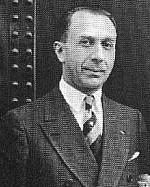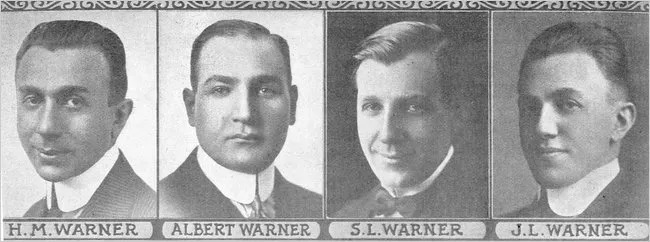Harry Morris Warner
1881 - 1958

Warner was born Hirsch Moses "Wonsal" or "Wonskolaser" in Krasnosielc, Poland just outside Warsaw. He was born on December 12th, 1881. At the
age of 8 Warner moved with his family to Baltimore, Maryland. His father had moved a few years before the family to establish himself in the shoe repair trade.
Life was hard for the family when Warner's father was not able to make a living. The family moved around several times, going to London, Ontario, and
Youngstown, Ohio. The members of the family also began anglicizing their names. Warner's father had changed the family name to Warner when he first arrived in
the United States. Hirsch became Harry and Moses turned into Morris. This may have also been due to the fact, in the early 20th century there was a large anti
semitic movement, particularly in the banking industry.
In 1903, after trying many different trades, Warner and his brothers began buying movie theaters in the Pennsylvania area. They continued to expand their business
until 1910 when they sold the business due to pressures from outside companies, specifically Thomas Edison's Motion Picture Patents Company, which charged
large distribution fees for their films.
After selling their theaters, the Warner brothers joined forces with an ind‐

Harry Morris Warner
1881 - 1958

ependent film maker and began to produce films. Their first was Dante's Inferno in 1912. The film made a profit, Warner and his brothers were convinced that the way to make money in the
film industry was to make their own films.

The Warner brothers continued to make films until 1923. After the success of their film Gold Diggers, they officially
formed Warner Brothers Pictures, Inc. Harry was in charge of the studio.
Over the next few years, Warner Brothers Pictures made several films. Harry's younger brother Sam came to him with the idea of syncing sound up with the
picture. Harry was reluctant at first and eventually agreed as long as it was the music only, no dialogue. After financial problems hit the studio, Harry
eventually relented and agreed to allow dialogue, the first "talkie" went into production, The Jazz Singer. Ironically despite Harry's reluctance
to use sound, in later years he was called the Godfather of talkies.
During the Great Depression, the studio was little affected. In fact Warner took the opportunity to increase the company holdings of theaters, particularly in the
Northeast. Eventually they owned more than 250 movie theaters. During this time they also got into the radio business, although initially this prove unsuccessful
until Warner began buying up record labels and producers.
During World War II, Warner was an anti-axis spokesperson for the movie industry. He also occupied a central place in the Hollywood-Washington wartime propaganda
effort. Despite being a lifelong Republican, Warner was close friends with President Franklin Roosevelt and even supported his 1932 campaign in California.
In 1956, the remaining Warner brothers, their brother Sam passed away in the 1920's, decided to sell the studio. It was eventually bought largely by a
syndicate headed by a Boston banker. Unknown to
